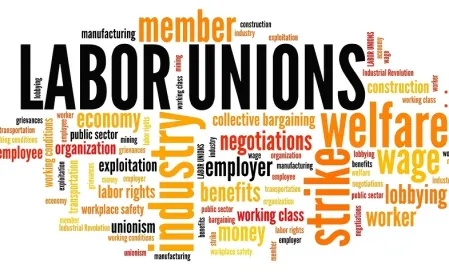Public sector employees who are non-members of a union cannot be legally required to pay agency or “fair share” fees as a condition of employment, the U.S. Supreme Court has held in a 5-4 ruling. Janus v. AFSCME Council 31, No. 16-1466 (June 27, 2018). Janus reverses the Court’s 1977 decision in Abood v. Detroit Board of Educ., 431 U.S. 209, in which the Court found such mandatory fees to be constitutional.
Justice Samuel Alito wrote the majority opinion. He was joined by Chief Justice John Roberts and Justices Anthony Kennedy, Clarence Thomas, and Neil Gorsuch.
In 2016, in Friedrichs v. Cal. Teachers Ass’n, 578 U.S. __, 136 S. Ct. 2545, the high court deadlocked 4-4 on the same issue, resulting in affirmance of the lower court decision that found the compulsory fees permissible. Friedrichs came soon after the death of Justice Antonin Scalia, who many believed would have voted to overrule Abood. In Janus, Justice Gorsuch, who was nominated by President Donald Trump and confirmed by the Senate in 2017, was the deciding vote for reversal of Abood.
Background
Mark Janus is a child support specialist employed by the Illinois Department of Healthcare and Family Services. He is represented by, but not a member of, AFSCME Council 31. As a non-member, the collective bargaining agreement between the state and AFSCME required Janus (and other non-members) to pay a “fair-share fee” to AFSCME, ostensibly to cover the costs of collective bargaining and contract administration. Under Illinois law, the agency fee may not be used for expenditures “related to the election or support of any candidate for political office.” However, as the Court noted, the union can use the agency fee to pay the costs of the union engaging in lobbying, advertising, litigation, social and recreational activities, and non-specific “services” that “may ultimately inure to the benefit of the members” of the union. The employment of a non-member who fails to pay a contractually required fair-share fee can be terminated by the state pursuant to the labor contract.
Janus refused to join the union because he opposed many of the public policy positions that the union advocates, including the positions it takes in collective bargaining. In his complaint, he claimed that all non-member fee deductions are coerced political speech and that the First Amendment forbids coercing any money from non-members. He believed that the union’s behavior in the bargaining did not appreciate Illinois’ current fiscal crises and it did not reflect his best interests or the best interests of Illinois citizens.
First Amendment Violation
After disposing of a “faulty” standing issue, the Supreme Court decided that a state’s (or a state political subdivision’s) enforcement of a provision in a collective bargaining agreement between a state government entity and a labor union requiring non-members to pay mandatory fees to the union as a condition of employment violates the Free Speech Clause of the First Amendment.
The Court held the governmental requirement that a public sector employee pay an agency fee to a union is a form of compelled speech in that non-members are forced to subsidize the speech of another, with whose positions they may disagree. The Court said:
Under Illinois law, public employees are forced to subsidize a union, even if they choose not to join and strongly object to the positions the union takes in collective bargaining and related activities. We conclude that this arrangement violates the free speech rights of nonmembers by compelling them to subsidize private speech on matters of substantial public concern.
Citing Justice Robert Jackson’s “memorable” passage from the Court’s decision in West Virginia Board of Educ. v. Barnett, 319 U.S. 624, 642 (1943), the Court noted that freedom of speech includes both the right to speak freely and the right to refrain from speaking at all:
If there is any fixed star in our constitutional constellation, it is that no official, high or petty, can prescribe what shall be orthodox in politics, nationalism, religion, or other matters of opinion or force citizens to confess by word or act their faith therein.
The Court held that “[c]ompelling individuals to mouth support for views they find objectionable violates [Justice Jackson’s] cardinal constitutional command…” and “measures compelling speech are at least as threatening” as those that involve restrictions on what can be said.
Respect for Precedent Argument
The Court noted that it “recognize[d] the importance of following precedent unless there are strong reasons for not doing so” and held that those reasons existed in this case because “Abood was poorly reasoned.” It said that Abood had led to practical problems and abuse, was inconsistent with other First Amendment cases, and had been undermined by more recent decisions.
Related to this, the Court made short shrift of the claim that the First Amendment was not originally understood to provide any protection for the free-speech rights of public employees. The Court wrote that “we doubt that the union – or its members – actually want us to hold that public employees have no free-speech rights” since Abood itself would have to be overruled under those circumstances and that numerous other precedents would have to be overturned as well.
The Court noted that in prior cases, it “recognized that a ‘ “significant impingement on First Amendment rights” ’ occurs when public employees are required to provide financial support for a union that ‘takes many position during collective bargaining that have powerful political and civic consequences.’”
Standard of Review
The Court reviewed the different standards of review it has used in determining whether in a particular case the governmental regulation of speech is permissible. It has utilized different standards – “strict scrutiny,” “exacting scrutiny,” or “rational-basis review,” for example – to decide if the regulation is constitutional. Here, the Court found that the compelled speech of the required agency service fee did not meet even the least demanding standard of review – “rational-basis review.”
Labor Peace Argument
In deconstructing Abood, the Court noted that “[i]n Abood, the main defense of the agency-fee arrangement was that it served the State’s interest in ‘labor peace.’” However, it pointed out that large numbers of public sector employees are represented by labor unions and yet are not compelled to pay an agency fee, rebutting the Abood Court’s assumption that union representation and a requirement to pay union dues were inextricably intertwined. “Whatever may have been the case 41 years ago when Abood was handed down, it is now undeniable that ‘labor peace’ can readily be achieved ‘through means significantly less restrictive of associational freedoms’ than the assessment of agency fees.”
“Free Riders” Argument
The Court also addressed the argument that, without mandatory agency fees, some employees may become “free riders” on the collective bargaining process. The majority countered this, writing that “avoiding free riders is not a compelling interest.” As an example, the Court said, “Suppose that a particular group lobbies or speaks out on behalf of what it thinks are the needs of senior citizens or veterans or physicians, to take just a few examples. Could the government require that all seniors, veterans, or doctors pay for that service even if they object?”
The Court answered no to that question:
In simple terms, the First Amendment does not permit the government to compel a person to pay for another party’s speech just because the government thinks that the speech furthers the interests of the person who does not want to pay.
The Court also noted that when a union enforces the collective bargaining agreement (e.g., by pursuing the grievance of a non-member), the union is attempting to vindicate the rights of all employees covered by the contract – members and non-members alike – and it is therefore engaging in an activity that furthers its representational rights.
(The Court left the door open for the possibility that individual non-members could be required to pay for union services on an à la carte basis. It noted that, by way of example, in connection with the “free ride” issue, individual non-members could be required to pay for representation in disciplinary matters.)
The Dissent
The 28-page dissenting opinion, authored by Justice Elena Kagan, and joined by Justices Ruth Bader Ginsburg, Stephen Breyer, and Sonya Sotomayor, stressed the practical implications of overruling Abood. The dissent argued that Abood:
struck a balance, which has governed this area ever since. On the one hand, employees could be required to pay fees to support the union in “collective bargaining, contract administration, and grievance adjustment.” ... But on the other hand, employees could not be compelled to fund the union’s political and ideological activities. Outside the collective-bargaining sphere, the Court determined, an employee’s First Amendment rights defeated any conflicting governmental interest.
Justice Kagan wrote that Abood achieved the practical goal of “facilitating stable labor relations,” and was able to do so because the “union has a secure source of funding,” including “agency fees [which] are often needed to ensure such stable funding.” Regarding “free riders,” while Justice Kagan observed that unions are required to represent all employees in the bargaining unit, she did not deal with the countervailing argument that unions accept this responsibility not knowing if the collective bargaining agreement they hope to negotiate will contain a mandatory agency fee provision.
As to the constitutional issue that underpinned the majority opinion, the dissent argued that in order for the government to limit the speech of a public sector employee when speaking as a citizen and not about a workplace concern, the government must only show “that legitimate workplace interests lay behind the speech regulation.” This is the lowest standard of review of a First Amendment restriction. Justice Kagan wrote that Abood met this standard because the government regulation, here the requirement to pay an agency service fee, “protect[ed] its managerial interests” (the assurance that the presence of an exclusive employee representative to bargain with creates) without going so far as to compel speech for political causes.
Implications
Unions that represent public sector employees anticipate that a significant number of non-members will cease paying agency fees to the union that represents them. For example, the Service Employees International Union, one of the largest unions in the country, months ago laid off employees at its national headquarters in anticipation of the Court’s decision. Other unions likely will follow the SEIU’s cost-cutting lead. We also expect that unions’ budgets for legislative lobbying will decrease.
Unions representing public sector employees will consider alternative strategies to encourage non-members to continue to support the union financially. Whether unions engage in more effective – and personal – persuasion of non-members of the value of becoming or remaining a union member or becoming more militant at the workplace or in politics remains to be seen. A number of unions are engaging in this “internal organizing” – meeting in-person with members and non-members to educate them about the value of union representation in the hope they will become full dues-paying members.
State legislatures also may become involved. Indeed, in New York, legislation recently was enacted to clarify that unions cannot be forced to provide full membership benefits to non-members.
As many unions that represent public sector employees also represent private sector employees – and want to represent more of them – unions may seek to become more financially efficient in order to continue their organizing efforts in the private sector. Unions will use their trimmed resources to meet their current statutory duties to represent employees at workplaces where they now have representation rights. However, the unions’ advocacy could become less robust if their reduced financial pool requires them to make do with fewer union officials or otherwise strains their ability to shoulder the costs of representation. Unions may increase their efforts to enlist partners (e.g., community groups, politicians, and religious leaders) to work as low-cost, force multipliers in their organizing efforts.






 />i
/>i

